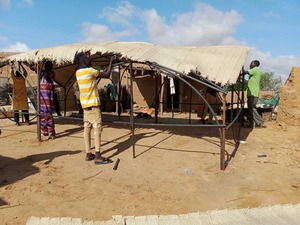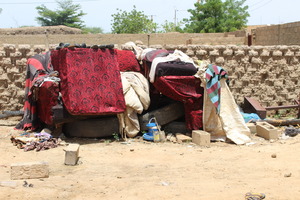Worst floods in 20 years in Niger: HI helps the affected communities
The 2024 rainy season has caused catastrophic flooding in Niger, affecting more than a million people. Humanity & Inclusion has been running emergency operations to support the families concerned.

Ouzey and her children are victims of the flooding in the region of Tillabéri, in Niger. | © A. M. Anassou Garba / HI
In Niger, the rainy season often brings flooding. Many of the villages are built with "banco", sun-dried mudbricks that have little resistance to severe rainfall. While the rainy season has always brought its share of bad weather, extreme climate events have become much more frequent in the Sahel in recent years due to climate change.
The worst floods in 20 years
Once again, the impact of climate change on vulnerable populations has been severe this year. The floods that hit Niger have set a sad record: they are the worst the country has seen in 20 years1.
The torrential rains in July and August 2024 caused considerable damage and led to the deaths of almost 400 people. By October 2024, more than a million people had been affected. More than 150,000 houses had collapsed and nearly 26,000 head of livestock were lost.
Bringing aid to the flood victims
 In the Tillabéri region in the west of Niger, where HI has a long-standing presence, the recent floods have caused extensive damage to infrastructure, with bridges and roads damaged and fields underwater. In August 2024, more than 33,000 people were affected by the floods, heightening the already considerable needs in a region marked by poverty.
In the Tillabéri region in the west of Niger, where HI has a long-standing presence, the recent floods have caused extensive damage to infrastructure, with bridges and roads damaged and fields underwater. In August 2024, more than 33,000 people were affected by the floods, heightening the already considerable needs in a region marked by poverty.
“I was fast asleep when a strange feeling woke me up. The rooms in the house were half-flooded and we all had our feet in water. I quickly woke everyone up so that we could evacuate and get the children to safety. It was a race against the clock, but I managed to find shelter for the children in a nearby mosque. That night, it was about saving human lives. The only possessions we had were completely submerged by the floodwaters,” recounts Dommo Siddo, who lives in the village of Sargane with his eight children.
To support the families affected, HI has been deploying emergency aid, providing financial support to more than 9,800 people and planning the distribution of 200 emergency shelters for more than 1,500 people whose houses had been destroyed.
Meeting urgent needs
 Ouzey Amirou, 35, lives in Daikeina with her husband and eight children. On 7 July 2024, heavy rain fell on their village, causing extensive damage. The water level rose rapidly and several family plots were flooded; some houses collapsed under the force of the rain. At Ouzey's house, the water also wreaked havoc. That day, the family lost many of their possessions. Several weeks later, the mattresses, blankets and furniture are still piled up in the courtyard in the hope that the sun will dry them out.
Ouzey Amirou, 35, lives in Daikeina with her husband and eight children. On 7 July 2024, heavy rain fell on their village, causing extensive damage. The water level rose rapidly and several family plots were flooded; some houses collapsed under the force of the rain. At Ouzey's house, the water also wreaked havoc. That day, the family lost many of their possessions. Several weeks later, the mattresses, blankets and furniture are still piled up in the courtyard in the hope that the sun will dry them out.
A few days after the floods, an HI team visited Daikeina to inform local inhabitants about the risks brought by the floods and the best preventive practices to adopt. Several affected households, including Ouzey’s, also received financial aid to help them cope with the emergency.
”My family received the sum of 40,000 CFA francs, which enabled us to buy food, especially cereals, and other essentials. This aid has really helped us get through this difficult time,” says Ouzey.
The emergency aid project for the households affected by the severe weather is being implemented in the Tillabéri region of Niger. A total of 801 households received financial support and 200 shelter kits were distributed between August and September 2024.




